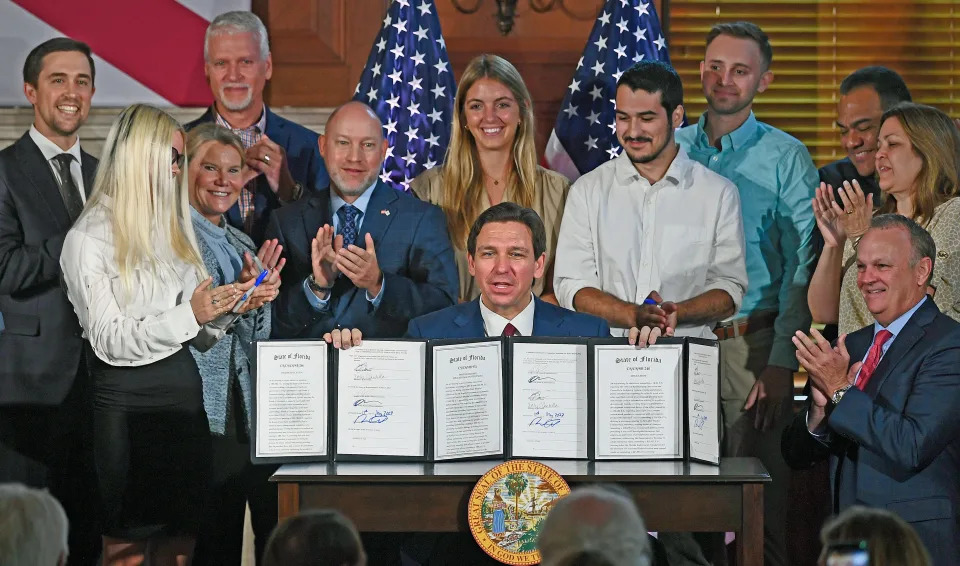The Hill
Texas passes bill stripping authority from cities
Saul Elbein – May 16, 2023
A sweeping Texas bill stripping authority from cities passed the state Senate on Tuesday and is now headed to the governor’s desk.
House Bill 2127 takes large domains of municipal governing — from payday lending laws to regulations on rest breaks for construction workers to laws determining whether women can be discriminated against based on their hair — out of the hands of the state’s largely Democratic-run cities and shifts them to its Republican-controlled legislature.
According to the Austin American Statesman, Gov. Greg Abbott (R) has been a vocal supporter of the bill.
Progressive critics argue the legislation — which one lawyer for Texas cities called “the Death Star” for local control — represents a new phase in the campaign by conservative state legislatures to curtail the power of blue-leaning cities.
Opponents of the bill include civil society groups like the AFL-CIO — and representatives of every major urban area in Texas, along with several minor ones.
They argue the shift in power it would enable would hamstring cities’ abilities to make policies to fit their unique circumstances.
“Where the state is silent, and it is silent on a lot — local governments step into that breach, to act on behalf of our shared constituents,” state Sen. Sarah Eckhardt (D) told the Senate on Tuesday.
“We should be doing our job rather than micromanaging theirs.”
But the bill’s Senate sponsor, state Sen. Brandon Creighton (R), said it was necessary to protect “job creators” from “cities and counties acting as lawmakers outside of their jurisdiction.”
Both the legislation’s sponsors and the principal trade group that backed it — the National Federation of Independent Businesses (NFIB) — have argued local regulation poses an existential threat to Texas businesses.
“As prices escalate, property taxes increase, and workers remain in short supply, small business owners are continuing to struggle in this economic environment,” said Annie Spilman, state director of the NFIB, in a statement earlier this month. “Arduous local ordinances, no matter how well-intended, exacerbate these challenges.”
The NFIB’s solution to that problem: one set of rules governing business across the state, which it says will cut costs by preventing the “patchwork” of local and county regulations that govern Texas’s sprawling cities.
While the NFIB and the legislation are officially nonpartisan, support for the bill has been overwhelmingly Republican.
The bill passed the state Senate 18-13 on a nearly party-line vote after passing the House in April with the votes of just eight out of 65 Democrats.
If enacted, the legislation would have a wide reach, banning — technically “preempting” — broad swaths of the state code.
It would nullify many existing ordinances, like Austin and Dallas’s heat protections for construction workers.
It would also ban new restrictions on payday lending or puppy mills, although — after a long fight — existing city laws will be preserved.
Urban advocates say other specific local laws without state or federal analogs — like an Austin law banning discrimination based on hair texture or style — would also likely be struck down.
The bill failed to pass in the 2019 or 2021 sessions — in part because it was seen as too broad, Austin City Councilor Ryan Alter told The Hill.
But with every failed passage, Alter said, “The bill has only gotten broader.”
Alter listed the state preemption of the Property and Business and Commerce codes as two domains that would lead to unforeseen consequences for cities.
“We do a lot of things as the city as relates to property, land use and issues concerning land, and we make a lot of decisions that impact business and commerce,” Alter added.
The bill also preempts city and county ordinances relating to the Agriculture Code, Finance Code, Insurance Code, Labor Code, Natural Resources Code and Occupations Code.
One worry among the legislation’s opponents is procedural.
The state legislature only meets every two years, making each session a logjam of potential bills, most of which never go anywhere. In 2022, for example, the Legislature passed about 38 percent of the nearly 10,000 bills introduced.
That low frequency of meetings and state-level focus make the Legislature a body opponents argue is ill-suited to managing the day-to-day affairs of cities.
Under the new law, “cities and counties across Texas will have to rely on the state’s part-time Legislature, which meets for only 140 days every two years, to address various issues and problems of local concern,” Adrian Shelley, Texas director for public interest advocacy group Public Citizen, said in a statement.
Spilman of the NFIB has argued the law was necessary to rein in out-of-control municipal governments.
The long campaign for the legislation that became H.B. 2127 began in 2018, when Dallas, Austin and San Antonio passed ordinances requiring employers to offer paid sick leave.
Those laws were later shot down by state and federal courts as a violation of state bans on raising the minimum wage above the federal standard.
But the ordinances would have given city governments subpoena power to investigate potential violations — powers which worried the NFIB, Spilman said in an April statement.
“I just don’t know why a city ordinance would have something in there like that. That’s very frightening to a small business owner, with no compliance officers.”
The need for the legislation was urgent, she added at the time. “You go another two years without this protection — we just don’t know what cities might propose next.”
Opponents, meanwhile, argue the bill would present challenges to businesses because its scope is so broad as to make it impossible to say how far it will reach.
“If there is one thing businesses hate it is uncertainty,” Houston city attorney Collyn Peddie wrote in an April statement.
“Because 2127 barely attempts to define the fields that it purports to preempt, [self-governing] cities will not know what laws to enforce and, more important, businesses will not know what laws to obey,” Peddie continued.
Another source of concern for bill opponents is the method of enforcement, which — as in the case of the state’s “bounty” abortion ban — would occur through lawsuits.
The bill would authorize “any person who has sustained an injury in fact, actual or treated” to sue cities and counties for passing ordinances in areas now officially under the domain of the state.
Winners of such suits would get damages and attorney’s fees covered.
Whenever cities pass big ordinances, “people get clever in their lawsuits to challenge anything they don’t like,” said Alter, the Austin councilor.
“And because the bill is so broad there are a lot of opportunities for people to poke holes in any bills the city passes.”
The NFIB’s position is that the newly preempted powers aren’t being taken away from cities: They’re ones the cities never had to start with, as Spilman explained to The Hill.
The legislation’s GOP sponsors agree. “It’s a ‘stay in your lane’ bill,” Rep. Dustin Burrows (R) said at a February event hosted by the NFIB. “If you’re a city, do your core functions. If you’re a county, do your core functions.”
Burrows has dismissed critics of the bill as “taxpayer-funded lobbyists” who he told the Texas Tribune in March were “out in full force trying to undermine this effort.”
In those remarks, Burrows took a tack familiar from statehouse Republican messaging nationwide.
Groups opposing the bills, he added, “are beholden to special interest groups who cannot get their liberal agenda through at the statehouse, so they go to city halls across the State, creating a patchwork of unnecessary and anti-business ordinances.”
But bill opponents argued that local laws are a “patchwork“ because local conditions are, too.
“Lawmakers who voted for this must explain to their constituents why they gave away local authority to lawmakers hundreds of miles away in Austin who may have never even set foot in their community,” said Adrian Shelley, Texas director of advocacy group Public Citizen.
Eckhardt, the state senator from Bastrop, argued the legislation “obliterates the local balancing of interests that creates the distinct local flavor from Lubbock to Houston, Laredo to Texarkana.”
Bills like House Bill 2127 “excuse the Texas legislature from leading,” she added.
“We are wasting our precious 140 days — when we could be doing statewide health, education, justice and prosperity policies — barging into bedrooms, locker rooms, boardrooms examining rooms and now city council meetings.”







